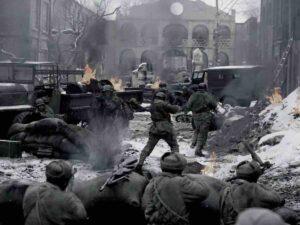The South Korean film industry has produced a good amount of high-quality war movies over the years. These films tend to address the scuffle between South Korea and North Korea or attempt to acknowledge the contribution of Koreans to the Vietnam War. We’ve tried to put together some of the best Korean war movies ever made. While some of these center around jaw-dropping battle scenes, others focus on the more humane aspects of the war.
So, without further ado, let’s begin!
1) Silmido (2003)
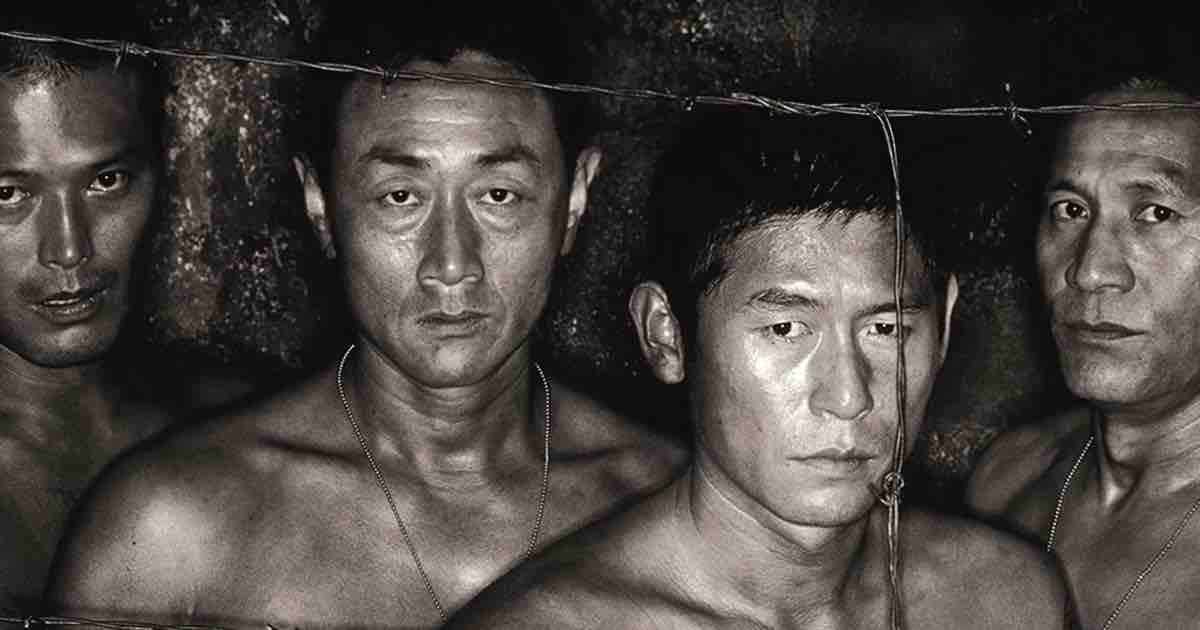
Based on the best-selling novel of the same name by Baek Dong-ho, Silmido recounts the Korean Republic Army’s plan to assassinate the then North Korean President Kim Il-Sung. Around 31 criminals and death row inmates are shipped to the remote island of Silmi to prepare for the mission. They undergo intense physical and mental training. But, the mission is aborted and the unit terminated to maintain utmost secrecy of the covert assignment.
The screenplay gives us enough scenes to connect with the recruits but doesn’t mention any political developments happening outside the island. Seol, who plays Kang and Ahn, who plays a tough commander stand out from the rest of the cast. Top-notch editing and a memorable soundtrack help overlook the cinematic liberties taken by the makers.
Kang Woo-suk’s Silmido opened to rave reviews and packed audiences, raking in over $30 million within 26 days of its release. It held the distinction of being the most viewed film in theaters.
Taegukgi later broke this record in 2004.
2) Taegukgi: The Brotherhood of War (2004)
Kang Je-gyu’s film redefined the South Korean film industry forever with its well-choreographed action and excellent acting. It was lauded for its technical excellence and even bagged the Grand Bell Awards for Art Direction, Cinematography, and Special Effects. Its commercial success paved the way for other war movies, some of which are featured on this list.
The plot revolves around two brothers, played by Jang Dong-gun and Won Bin who’re pitted against each other in the Korean War. The action moves from urban warfare in Pyongyang to a hillside battle along the 38th parallel. The Korean War separated families and it wasn’t entirely uncommon for siblings to fight on opposing sides. The Statue of Brothers in Seoul is a perfect illustration of this practice.
Taegugki: The Brotherhood of War holds a special place in the hearts of Koreans, serving as a poignant reminder of the crippling aftermath of war.
3) Welcome to Dongmakgol (2005)
This South Korean film is based on a long-running stage play of the same name. The plot unfolds against the backdrop of the Korean War in the 1950s. Soldiers from South and North Korea and an American pilot chance upon a remote town whose residents are unaware of the war. The inhabitants of the village seem bewitched by the guns that the soldiers seem to be pointing at each other, unaware at all of a war. After spending some time in the quiet town, the visitors cave into the innocence of Dongmakgol. They must now arrive at a way to save the idyllic village from annihilation.
Welcome to Dongmakgol was South Korea’s official entry for Academy Awards in the foreign-language category. It also had a great run at the box office captivating viewers across the country. The film’s a satisfying watch with heartwarming characters and a soulful soundtrack composed by the great Joe Hisaishi.
4) A Little Pond (2009)
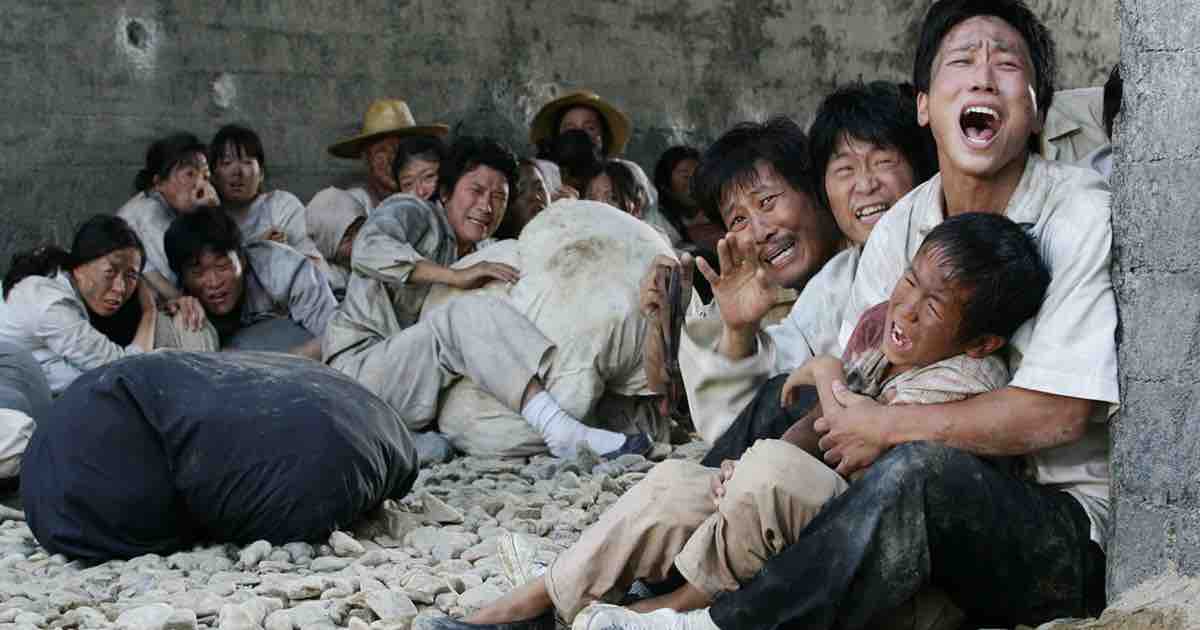
Directed by Lee Sang-woo, A Little Pond depicts the No Gun Ri massacre, an infamous moment from the Korean War. In July 1950, American soldiers open fire upon an innocent group of South Korean refugees on the suspicion of harboring criminals from North Korea. This incident was met with a lot of backlashes and sparked anti-American sentiments across all of Korea. The harrowing story was first picked up by Associated Press journalists whose report was later adapted into a Pulitzer Prize-winning book.
Using this book as an inspiration, A Little Pond retells the events surrounding the massacre in a gut-wrenching fashion. It also features an ensemble cast comprising of some of the top actors from the industry like Park Hee-jin, Lee Dae-Yeon, and Moon Sung-Keun. While this may not be your conventional war movie, it’s still an incredibly empathetic look into one of the darkest moments of the Korean War.
5) 71: Into the Fire (2010)
Based on true events, 71: Into the Fire focuses on a group of 71 student soldiers who were killed during the Battle of P’ohang-dong. The rag-tag team of individuals was mostly ill-equipped and severely under-trained. In spite of this, for 11 hours, they put up a valiant fight defending the local P’ohang girls’ middle school from North Korean forces.
The film takes a no-holds-barred approach in depicting the brutal sacrifices of the student soldiers. The combat scenes are all well-crafted and T.O.P, a famed K-pop star who plays the leading man brings the right amount of vulnerability to his character. It should come as no surprise that the film had a phenomenal run at the box office. The film also won the popularity award in the 2010 Grand Bell Awards. 71: Into the Fire succeeds in its mission of raising awareness about the presence and importance of student soldiers during a tumultuous period in Korean history.
6) The Front Line (2011)
Winner of four prestigious Grand Bell Awards including Best Film, The Front Line is essential viewing for any fan of the genre. The film is set during the late part of the Korean War, during the ceasefire negotiations. There’s still palpable tension in the air as both sides are vying for a strategic advantage over the other. Amidst this tussle, a South Korean officer is sent to investigate a supposed infiltration by enemy troops.
The Front Line was South Korea’s submission to the 84th Academy Awards for Best Foreign Language film. Sadly, it did not make the cut. Unlike other films on this list that base the narrative around characters distant from the battlefield, this Jang-Hoon directorial is set right amidst the action. He creates magnificent action set pieces featuring tens of sniper battles and trench warfare.
One of the best Korean war movies, The Front Line makes a subtle statement about this being a way of life for soldiers who put themselves at stake day in, day out.
7) In Love and War (2011)
Comedy, drama, and war intersect in Geon-yong Park’s film. It offers a slightly light-hearted perspective on the Korean War. The plot follows a group of North Korean soldiers entering a remote village in South Korea. To survive, the villagers offer them a hospitable welcome. Meanwhile, the commander of the North Korean troop has a secret agenda of ferreting out reactionaries. Amidst the threat of war, the soldiers and villagers forge a genuine friendship.
A forbidden love story also begins to brew between a North Korean lieutenant and a young village girl. Is peaceful co-existence on the cards? Or would the bonds prove fragile amid the frightening realities of war?
In Love and War serves as a wake-up call, highlighting the plight of innocent civilians who are possibly the most vulnerable in the Korean War. It makes us think about the futility of war and its impact on powerless communities.
8) My Way (2011)
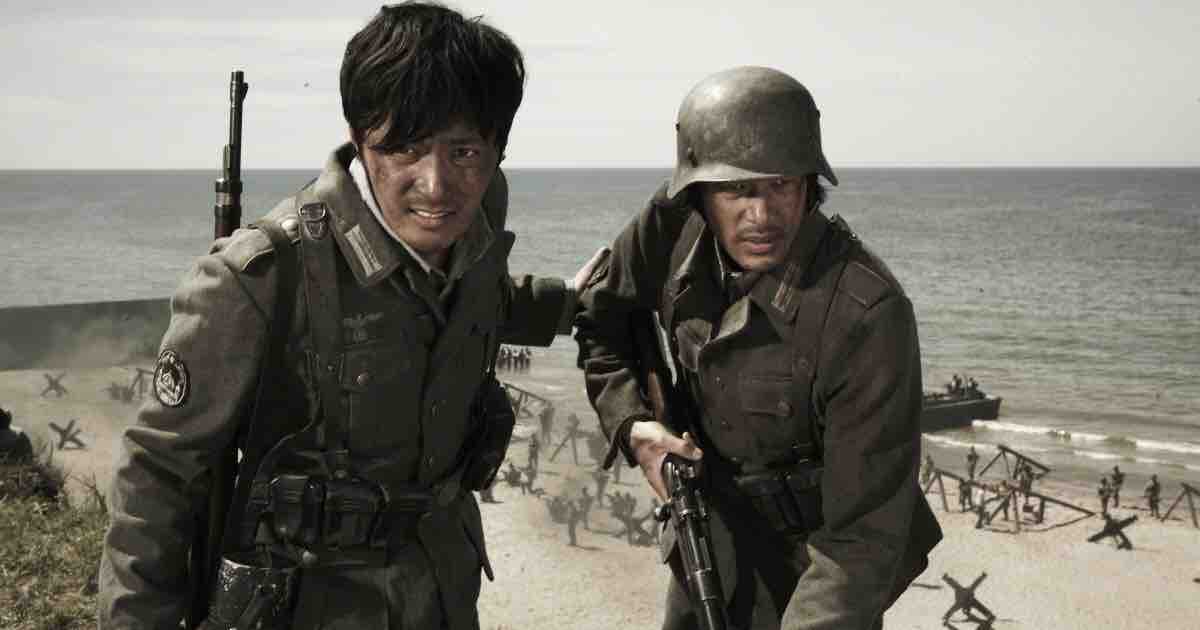
Korean director Kang Je-kyu’s big-budget drama narrates the incredible tale of a soldier named Yang Kyoungjong. Yang was conscripted into the Japanese army at the tender age of 18 when Korea was still under Japan’s rule and desperately needed more soldiers. He then participated in the Battle of Kharkiv in 1942. His tryst with battles continued when he was recruited by Germans to fight at the port of Cherbourg. Imprisoned by British forces, he was sent to a camp in the United States. When the war concluded, Yang decided to stay back in Illinois.
My Way recreates the globe-trotting journey of Yang in dramatic fashion. The action is solid, punctuated by stunning pyrotechnics and a range of weapons like swords, rifles, and sticks. There’s one scene, in particular, involving an arsenal of military vehicles that I loved. A dizzying handheld camera used to capture these scenes makes the experience all the more immersive. But, I would have loved the film to explore the psyche of the central character.
9) Ode To My Father (2014)
This Yoon Je-kyoon directorial is the fourth highest-grossing South Korean film of all time with a record 14.2 million tickets sold. Ode To My Father depicts an ordinary man’s life from the 1950s to the present. Though parts of the movie are not set in wartime, significant events from Korean history like the Vietnam War and the Korean War find a mention. We get to see how certain experiences like the Hungnam evacuation shaped up the protagonist’s life.
Ode To My Father was heavily criticised on release, for idealising authoritarian regimes and glorifying industrialisation that’s taken a heavy toll on society.
Brushing all politics aside, Yoon Je-kyoon said the film was a tribute to his father who left him at an early age. He even named the characters in the film after his parents. Deok-soo and Young-ja.
Ode To My Father is a moving portrait of an everyday man and his fight for survival in times of power-hungry countries battling it out for supremacy.
10) The Long Way Home (2015)
Few war movies focus on companionship. Cheon Sung-il’s directorial debut The Long Way Home is a wonderful exception. It portrays the camaraderie between a South and North Korean soldier in the wake of the Korean War.
Jang Nam-bok, a South Korean soldier is assigned to deliver a top-secret document. However, he loses the document after getting caught in a crossfire. It falls into the hands of a North Korean trooper named Yeong-gwang. In a strange turn of events, the two men forge an unlikely bond whilst competing against each other for the document with sensitive information that could potentially change the face of war.
Cheon Sung-il commented that he wanted to show the dual sides of the war; one of war on a larger scale and the other of the plight of the individuals involved. He tries to achieve this by interspersing wholesome moments of comedy with intense battle scenes. While each element works well individually, both don’t come together to make a cohesive film. Nevertheless, it’s still worth a watch for the excellent work from its lead actors.
11) Operation Chromite (2016)
Centered around the events of the Battle of Inchon, Operation Chromite focuses on a team of South Korean soldiers who disguise themselves as North Korean troopers to make an amphibious landing at the port of Inchon. The objective was to infiltrate the border and gain military intelligence regarding nine naval shipments deployed around the port. Things go awry as the soldiers run into unforeseen difficulties. With the success of the mission at stake, can the team find a way in the nick of time?
In addition to an exceptional cast of local talents, Liam Neeson stars as General Douglas MacArthur who’s seen barking orders to the covert team. Operation Chromite’s a nail-biting thriller that keeps you glued to the screen throughout.
A sequel and the second in the trilogy, The Battle of Jangsari released in 2019. The film highlights a real-life incident where student soldiers were used in a suicidal mission to distract North Korean soldiers from the Jangsari Beach during the Korean War.
Watch Battle for Incheon: Operation Chromite on Amazon Prime
12) Steel Rain (2017)
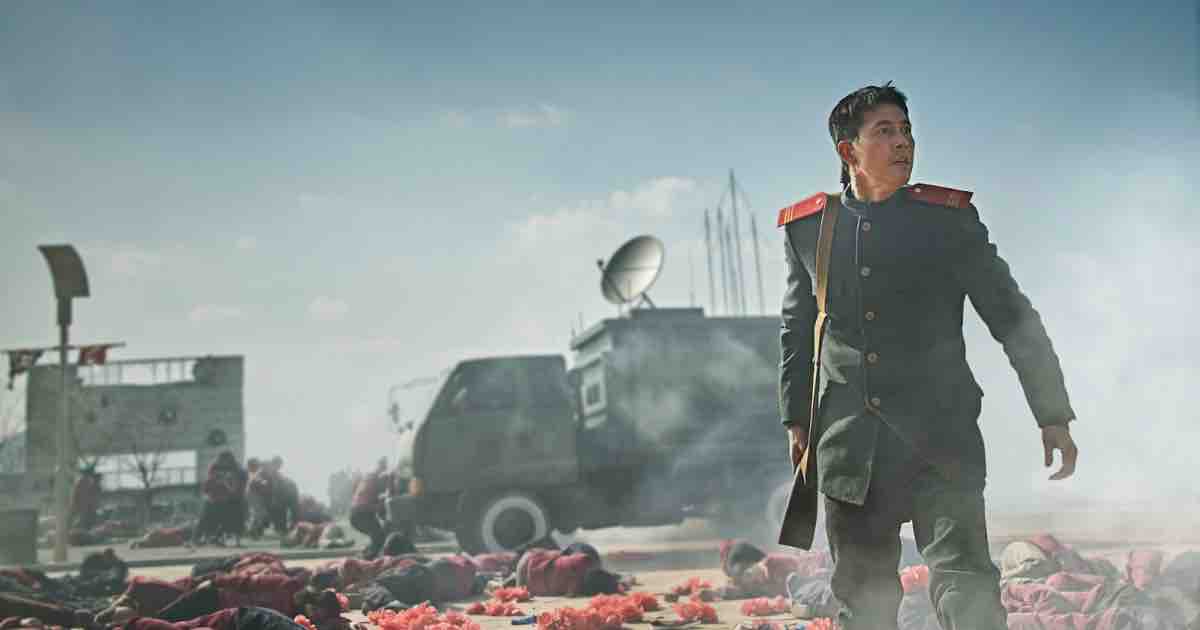
This espionage thriller/war film follows a North Korean spy (played by Jung Woo-Sung) who gangs up with a South Korean official (played by Kwak Do-won) to stop an imminent nuclear war on the Korean Peninsula. The movie begins with a coup in North Korea as a cohort of generals attack and seize power. This event sparks tension across the border forcing one side to resort to flag attacks. Our team of protagonists must learn a way to work together and restore peace across the country.
Steel Rain boasts plenty of enthralling battle scenes that feature an array of military hardware. From B-52 bombers, attack helicopters to intercontinental ballistic missiles, every weapon you can imagine makes an appearance. In my opinion, the action set pieces are reason enough to watch this one.
Owing to the success of the film, the makers released a sequel Steel Rain 2: Summit. The lead pair returned to star in the film. But, instead of reprising their roles from the original, they played different characters.
Conclusion
You’ve reached the end of the list. These are some of the best Korean War movies that should be on your watchlist. We’ve tried to include mainstream entertainers that draw from real-life events as well as films with a more realistic tone. If you’re looking to explore deeper, well you’re in luck. Check out White Badge (1992), which specifically talks about the Korean involvement in the Vietnam War, and Sunny (2008) that takes a slightly different route at depicting the same conflict.

